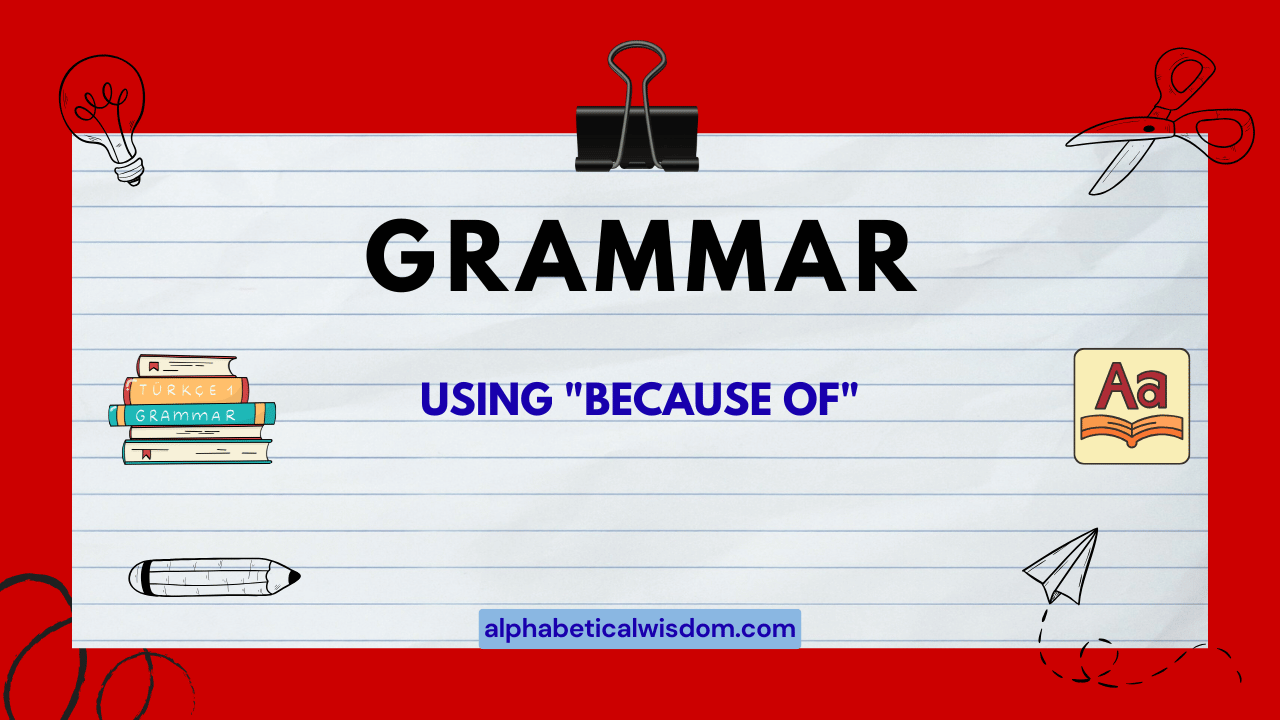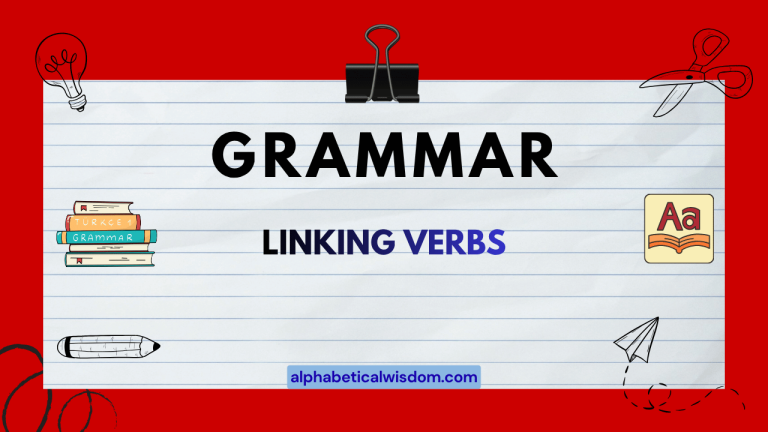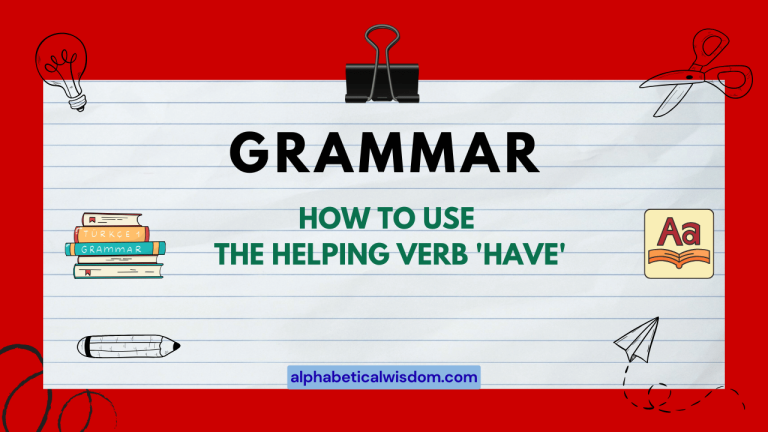Using “Because Of”: Grammar, Examples, and Usage Rules
Understanding how to use “because of” correctly is crucial for constructing clear and grammatically sound sentences. This phrase indicates cause and effect, providing reasons or explanations for events or situations.
Mastering its usage will improve your writing and speaking skills, allowing you to express yourself with greater precision. This article is designed for English language learners, students, and anyone looking to refine their understanding of English grammar.
Table of Contents
- Introduction
- Definition of “Because Of”
- Structural Breakdown
- Types and Categories
- Examples of “Because Of”
- Usage Rules
- Common Mistakes
- Practice Exercises
- Advanced Topics
- FAQ
- Conclusion
Definition of “Because Of”
“Because of” is a prepositional phrase used to indicate the cause or reason for something. It explains why a particular event occurred or why a situation exists. The phrase introduces a noun or a noun phrase, specifying the cause of the result stated in the main clause. Understanding its function is essential for constructing clear and coherent sentences.
In grammatical terms, “because of” functions as an adverbial prepositional phrase. It modifies the verb in the main clause by providing information about the cause or reason behind the action. This contrasts with the conjunction “because,” which introduces an entire clause with a subject and a verb. The distinction is critical for correct sentence structure.
The phrase is commonly used in both formal and informal contexts, making it a versatile tool in English communication. It appears in written and spoken language, across various genres, from academic papers to casual conversations.
This broad applicability underscores the importance of mastering its correct usage.
Structural Breakdown
The basic structure involving “because of” is: Main Clause + Because Of + Noun/Noun Phrase. The main clause states the result or effect, while the “because of” phrase provides the cause. The noun or noun phrase that follows “because of” identifies the specific reason.
For example: “The game was canceled because of the rain.” Here, “The game was canceled” is the main clause, and “because of the rain” explains why the cancellation occurred. “The rain” is the noun phrase providing the cause.
Another key aspect is the use of gerunds (verb forms ending in “-ing”) after “because of.” A gerund functions as a noun, allowing you to express an action as the cause. For example: “She succeeded because of her hard work and dedicated studying.” In this sentence, “her hard work and dedicated studying” is a noun phrase acting as the cause of her success.
It’s crucial to remember that “because of” should always be followed by a noun or noun phrase, not a clause. Using a clause after “because of” results in a grammatical error.
To introduce a clause of reason, use the conjunction “because” instead.
Types and Categories
While “because of” primarily serves one function – indicating cause – the contexts in which it is used can vary. Here are some categories to consider:
1. Direct Cause
This is the most straightforward usage, where “because of” directly explains the reason for an event. The cause is immediately apparent and directly leads to the result. Example: “The flight was delayed because of the storm.”
2. Indirect Cause
Here, the cause is not immediately obvious but still contributes to the outcome. The connection might require some inference or understanding of the context. Example: “The company’s profits declined because of changes in market trends.”
3. Multiple Causes
In some cases, several factors contribute to a result. “Because of” can be used to highlight one of the primary causes among many. Example: “He was late because of traffic and a missed alarm.”
4. Emotional Causes
“Because of” can also explain actions or behaviors driven by emotions. Example: “She cried because of the sad movie.”
5. Physical Causes
This involves physical factors or conditions that lead to a specific outcome. Example: “The plant died because of lack of water.”
Examples of “Because Of”
The following sections provide extensive examples of “because of” used in various contexts. These examples are categorized to illustrate different types of usage and sentence structures.
General Examples
These examples demonstrate basic usage of “because of” in common situations. They illustrate how the phrase connects a cause to an effect.
The table below provides 30 general examples of “because of” used in sentences. Each example demonstrates a clear cause-and-effect relationship.
| # | Sentence |
|---|---|
| 1 | The road was closed because of the accident. |
| 2 | We stayed inside because of the rain. |
| 3 | She was happy because of the good news. |
| 4 | He failed the test because of lack of preparation. |
| 5 | The concert was canceled because of the singer’s illness. |
| 6 | The flowers died because of the frost. |
| 7 | The team lost because of poor teamwork. |
| 8 | The project was delayed because of funding issues. |
| 9 | The party was a success because of great planning. |
| 10 | He was promoted because of his hard work. |
| 11 | The store closed because of low sales. |
| 12 | She was tired because of the long day. |
| 13 | The cake was ruined because of the burnt oven. |
| 14 | The bridge collapsed because of the earthquake. |
| 15 | They were late because of the traffic jam. |
| 16 | The car broke down because of engine failure. |
| 17 | The event was postponed because of unforeseen circumstances. |
| 18 | The garden flourished because of the gardener’s care. |
| 19 | He was grateful because of their support. |
| 20 | The city flooded because of heavy rainfall. |
| 21 | The company thrived because of innovative ideas. |
| 22 | She was excited because of the upcoming vacation. |
| 23 | The old building was demolished because of safety concerns. |
| 24 | The museum was popular because of its unique exhibits. |
| 25 | He succeeded because of his determination. |
| 26 | The book was praised because of its compelling story. |
| 27 | The river dried up because of the drought. |
| 28 | She was nervous because of the important presentation. |
| 29 | The project failed because of poor management. |
| 30 | The community improved because of volunteer efforts. |
Negative Consequences
These examples illustrate situations where “because of” explains the cause of a negative outcome or problem. They highlight the adverse effects resulting from specific causes.
The table below provides 30 examples of “because of” leading to negative consequences. These sentences showcase problems arising from specific causes.
| # | Sentence |
|---|---|
| 1 | The plants withered because of the lack of sunlight. |
| 2 | He lost his job because of his poor performance. |
| 3 | The relationship ended because of constant arguments. |
| 4 | The food spoiled because of improper storage. |
| 5 | The experiment failed because of a flawed hypothesis. |
| 6 | The car crashed because of reckless driving. |
| 7 | The project was canceled because of budget cuts. |
| 8 | She felt sad because of the bad news. |
| 9 | The business struggled because of poor marketing. |
| 10 | The computer crashed because of a virus. |
| 11 | The house flooded because of a burst pipe. |
| 12 | He was fined because of illegal parking. |
| 13 | The event was poorly attended because of insufficient advertising. |
| 14 | The machine broke down because of overuse. |
| 15 | The crops failed because of the drought. |
| 16 | She was disappointed because of the canceled trip. |
| 17 | The building deteriorated because of neglect. |
| 18 | The company lost money because of bad investments. |
| 19 | He got sick because of contaminated food. |
| 20 | The painting faded because of prolonged exposure to sunlight. |
| 21 | The meeting was unproductive because of constant interruptions. |
| 22 | She was stressed because of the heavy workload. |
| 23 | The concert was a disaster because of technical difficulties. |
| 24 | The experiment yielded incorrect results because of faulty equipment. |
| 25 | He was injured because of the slippery floor. |
| 26 | The package was delayed because of logistical problems. |
| 27 | She felt lonely because of the isolation. |
| 28 | The project was incomplete because of lack of resources. |
| 29 | The website crashed because of a cyberattack. |
| 30 | He was punished because of his misbehavior. |
Positive Outcomes
These examples showcase situations where “because of” explains the cause of a positive outcome or achievement. They demonstrate how specific factors contribute to success or happiness.
The table below lists 30 examples of “because of” leading to positive outcomes. These sentences highlight successes and achievements resulting from specific causes.
| # | Sentence |
|---|---|
| 1 | She succeeded because of her hard work and dedication. |
| 2 | The team won because of their excellent teamwork. |
| 3 | The project was a success because of careful planning. |
| 4 | He was promoted because of his outstanding performance. |
| 5 | The company thrived because of its innovative products. |
| 6 | She was happy because of the supportive friends. |
| 7 | The garden flourished because of the gardener’s care. |
| 8 | The event was well-attended because of effective marketing. |
| 9 | The business grew because of customer loyalty. |
| 10 | The community improved because of volunteer efforts. |
| 11 | He felt confident because of thorough preparation. |
| 12 | The book became popular because of its compelling story. |
| 13 | She was grateful because of the generous support. |
| 14 | The city prospered because of wise leadership. |
| 15 | The experiment was successful because of precise methodology. |
| 16 | He recovered quickly because of proper medical care. |
| 17 | The partnership was strong because of mutual respect. |
| 18 | The house was beautiful because of thoughtful design. |
| 19 | She felt fulfilled because of her meaningful work. |
| 20 | The company’s reputation improved because of ethical practices. |
| 21 | He was respected because of his integrity. |
| 22 | The project was completed on time because of efficient management. |
| 23 | She was inspired because of the motivational speaker. |
| 24 | The team’s morale was high because of positive feedback. |
| 25 | He felt healthy because of regular exercise. |
| 26 | The product sold well because of its high quality. |
| 27 | She was relieved because of the positive outcome. |
| 28 | The students excelled because of dedicated teachers. |
| 29 | The event was memorable because of the festive atmosphere. |
| 30 | He was optimistic because of the promising future. |
Complex Scenarios
These examples demonstrate the use of “because of” in more complex sentences, often involving multiple clauses or more nuanced relationships between cause and effect. These examples showcase a deeper understanding of how to integrate “because of” into sophisticated writing.
The following table presents 20 complex scenarios utilizing “because of.” These examples involve nuanced relationships between cause and effect, often integrated into longer, more sophisticated sentences.
| # | Sentence |
|---|---|
| 1 | The company’s stock price plummeted because of the CEO’s scandal and subsequent loss of investor confidence. |
| 2 | She decided to move to a new city because of the limited job opportunities in her hometown and the desire for a fresh start. |
| 3 | The project was delayed not only because of the initial funding shortage but also because of unexpected regulatory hurdles. |
| 4 | He struggled to concentrate on his studies because of the constant noise from the construction site next door and his own anxiety about the upcoming exams. |
| 5 | The small town’s economy suffered because of the closure of the local factory, which had been the primary source of employment for many residents. |
| 6 | She was able to overcome her fear of public speaking because of the encouragement from her mentor and her own persistent practice. |
| 7 | The historical building was preserved for future generations because of the tireless efforts of local preservationists and the generous donations from community members. |
| 8 | He felt a profound sense of gratitude because of the sacrifices his parents had made to provide him with a good education and a better life. |
| 9 | The scientific breakthrough was achieved because of the collaboration between researchers from different disciplines and the use of advanced technology. |
| 10 | She chose to volunteer at the animal shelter because of her deep love for animals and her desire to make a positive impact on their lives. |
| 11 | The film’s success was attributed not only to the director’s vision but also because of the outstanding performances of the cast and the captivating storyline. |
| 12 | He was able to repair the old car because of his extensive knowledge of mechanics and his access to the necessary tools and parts. |
| 13 | The community garden thrived because of the cooperative efforts of the residents and the abundance of natural sunlight and rainfall. |
| 14 | She decided to learn a new language because of her passion for travel and her desire to communicate with people from different cultures. |
| 15 | The company’s customer service improved significantly because of the implementation of a new training program and the adoption of a more customer-centric approach. |
| 16 | He felt overwhelmed by the amount of work he had to do because of the numerous deadlines and the lack of support from his colleagues. |
| 17 | The environmental damage was exacerbated because of the combination of deforestation and industrial pollution in the region. |
| 18 | She was able to maintain a healthy work-life balance because of her ability to prioritize tasks and her commitment to setting boundaries. |
| 19 | The museum’s attendance increased dramatically because of the new interactive exhibits and the extensive marketing campaign. |
| 20 | He was inspired to pursue a career in medicine because of his own experience with a life-threatening illness and his admiration for the doctors who saved his life. |
Hypothetical Situations
These examples use “because of” to describe hypothetical scenarios or potential outcomes based on certain conditions. They illustrate how the phrase can be used to explore cause-and-effect relationships in imagined situations.
The following table presents 20 hypothetical situations using “because of.” These examples explore potential outcomes based on imagined conditions, illustrating the versatility of “because of” in speculative contexts.
| # | Sentence |
|---|---|
| 1 | If it rains tomorrow, the picnic will be canceled because of the weather. |
| 2 | If the company invests in new technology, productivity could increase because of the improved efficiency. |
| 3 | If he studies hard, he will pass the exam because of his preparation. |
| 4 | If she practices regularly, her musical skills will improve because of the consistent effort. |
| 5 | If the government implements new policies, the economy might recover because of the stimulus. |
| 6 | If they reduce their carbon emissions, the environment will benefit because of the decreased pollution. |
| 7 | If he apologizes sincerely, she might forgive him because of his honesty. |
| 8 | If the team works together effectively, they could win the championship because of their teamwork. |
| 9 | If the city invests in public transportation, traffic congestion could decrease because of the reduced car usage. |
| 10 | If she takes a vacation, she will feel refreshed because of the rest and relaxation. |
| 11 | If the company improves its customer service, customer satisfaction will increase because of the better support. |
| 12 | If he learns a new language, he will have more job opportunities because of his enhanced skills. |
| 13 | If she volunteers regularly, she will feel more fulfilled because of her contributions to the community. |
| 14 | If the school implements new programs, student achievement could improve because of the enhanced learning environment. |
| 15 | If the hospital invests in advanced equipment, patient care will improve because of the better technology. |
| 16 | If he eats healthy and exercises, he will feel healthier because of his lifestyle choices. |
| 17 | If she reads more books, her knowledge will expand because of the increased exposure to information. |
| 18 | If the community promotes recycling, the environment will be cleaner because of the reduced waste. |
| 19 | If he attends the workshop, he will learn new skills because of the training. |
| 20 | If she joins a club, she will make new friends because of the social interaction. |
Usage Rules
The primary rule is that “because of” must be followed by a noun or noun phrase. It cannot be followed directly by a clause. Incorrect: “The event was canceled because of it rained.” Correct: “The event was canceled because of the rain.”
When you want to introduce a clause explaining the reason, use the conjunction “because.” For example: “The event was canceled because it rained.” This construction uses “because” to introduce the clause “it rained.”
Pay attention to the placement of “because of” in a sentence. While it often appears after the main clause, it can also begin a sentence, but this is less common and usually done for emphasis. When starting a sentence with “because of,” use a comma to separate the “because of” phrase from the main clause. For example: “Because of the heavy traffic, we were late.”
Avoid using “due to” and “because of” interchangeably in all contexts. While they are often similar, “due to” is more appropriately used when it directly modifies a noun. Compare: “His success was due to hard work.” (correct) vs. “He succeeded because of hard work.” (correct). “Due to” is often considered more formal.
Common Mistakes
One of the most common mistakes is using a clause after “because of.” Incorrect: “She was sad because of she lost her keys.” Correct: “She was sad because she lost her keys.” or “She was sad because of losing her keys.”
Another frequent error is misplacing the phrase within the sentence, leading to awkward or unclear constructions. Ensure the “because of” phrase is logically connected to the element it’s modifying. Unclear: “Because of the rain, the picnic we had to cancel.” Clear: “Because of the rain, we had to cancel the picnic.”
Confusing “because of” with “because” is also common. Remember, “because of” requires a noun or noun phrase, while “because” introduces a clause with a subject and a verb. Incorrect: “I was late because of I missed the bus.” Correct: “I was late because I missed the bus.” or “I was late because of missing the bus.”
The table below provides examples of common mistakes and their corrections. Pay attention to the differences to avoid these errors in your writing.
| # | Incorrect | Correct |
|---|---|---|
| 1 | The game was canceled because of it rained. | The game was canceled because of the rain. |
| 2 | Because of she was tired, she went to bed early. | Because she was tired, she went to bed early. |
| 3 | He failed because of he didn’t study. | He failed because he didn’t study. |
| 4 | The store closed because of people stopped shopping there. | The store closed because people stopped shopping there. |
| 5 | Because of the traffic, I was late I think. | Because of the traffic, I was late. |
| 6 | She was happy because of she got a good grade. | She was happy because she got a good grade. |
| 7 | The project failed because of they didn’t plan well. | The project failed because they didn’t plan well. |
| 8 | Because of the cold, we stayed inside so. | Because of the cold, we stayed inside. |
| 9 | He succeeded because of he worked hard always. | He succeeded because he always worked hard. |
| 10 | The event was successful because of people enjoyed it very much. | The event was successful because people enjoyed it very much. |
Practice Exercises
The following exercises will help you practice using “because of” correctly. Each exercise focuses on a different aspect of its usage, reinforcing your understanding and application of the rules.
Exercise 1: Sentence Completion
Complete the following sentences using “because of” and a suitable noun or noun phrase.
The table below provides sentence completion exercises using “because of.” Fill in the blanks with appropriate noun phrases to complete the sentences.
| # | Sentence | Answer |
|---|---|---|
| 1 | The flight was delayed __________. | because of the bad weather. |
| 2 | She was late to the meeting __________. | because of the traffic jam. |
| 3 | The plants died __________. | because of the lack of water. |
| 4 | He failed the exam __________. | because of his lack of preparation. |
| 5 | The concert was canceled __________. | because of the singer’s illness. |
| 6 | The team lost the game __________. | because of their poor defense. |
| 7 | The project was delayed __________. | because of funding issues. |
| 8 | The party was a success __________. | because of the excellent planning. |
| 9 | He got a promotion __________. | because of his hard work and dedication. |
| 10 | The store closed __________. | because of low sales. |
Exercise 2: Error Correction
Identify and correct the errors in the following sentences involving “because of.”
The table below contains sentences with errors in the use of “because of.” Identify and correct the mistakes to form grammatically correct sentences.
| # | Incorrect Sentence | Correct Sentence |
|---|---|---|
| 1 | She was happy because of she received a gift. | She was happy because she received a gift. |
| 2 | The road was closed because of it was an accident. | The road was closed because of the accident. |
| 3 | He failed the test because of he didn’t study. | He failed the test because he didn’t study. |
| 4 | Because of the rain, we decided to stay home so. | Because of the rain, we decided to stay home. |
| 5 | The event was canceled because of there weren’t enough attendees. | The event was canceled because there weren’t enough attendees. |
| 6 | She succeeded because of she worked hard. | She succeeded because she worked hard. |
| 7 | The project was delayed because of they had funding issues. | The project was delayed because they had funding issues. |
| 8 | Because of he was sick, he didn’t go to work and. | Because he was sick, he didn’t go to work. |
| 9 | They were late because of the traffic it was terrible. | They were late because the traffic was terrible. |
| 10 | The plants died because of no one watered them. | The plants died because no one watered them. |
Exercise 3: Sentence Transformation
Rewrite the following sentences using “because of” instead of “because.” You may need to adjust the sentence structure.
The table below provides sentences using “because.” Rewrite each sentence using “because of,” adjusting the structure as needed.
| # | Original Sentence | Rewritten Sentence |
|---|---|---|
| 1 | She was tired because she had a long day. | She was tired because of the long day. |
| 2 | He was late because he missed the bus. | He was late because of missing the bus. |
| 3 | The game was canceled because it rained. | The game was canceled because of the rain. |
| 4 | They were happy because they won the competition. | They were happy because of winning the competition. |
| 5 | The store closed because sales were low. | The store closed because of low sales. |
| 6 | She was sad because she lost her keys. | She was sad because of losing her keys. |
| 7 | The project failed because they didn’t plan well. | The project failed because of poor planning. |
| 8 | He succeeded because he worked hard. | He succeeded because of his hard work. |
| 9 | The event was successful because people enjoyed it. | The event was successful because of people’s enjoyment. |
| 10 | The city flooded because it rained heavily. | The city flooded because of heavy rainfall. |
Advanced Topics
For advanced learners, it’s important to understand the subtle differences between “because of,” “due to,” and “owing to.” While they all express cause, “due to” and “owing to” are generally considered more formal and are often used when the cause directly modifies a noun. For example: “The cancellation was due to unforeseen circumstances.” Here, “due to” directly modifies “cancellation.”
Another advanced aspect is using “because of
and” in complex sentence structures. This involves combining multiple causes to explain an outcome, requiring careful construction to maintain clarity. Example: “The company’s success was because of innovative marketing and a dedicated team.”
Understanding the nuances of tone and register is also crucial. While “because of” is suitable for most contexts, more formal situations might call for “due to” or “owing to” to convey a more professional tone.
Consider the audience and purpose of your writing when choosing the most appropriate phrase.
FAQ
Can I start a sentence with “Because of”?
Yes, you can start a sentence with “Because of,” but it’s less common and typically used for emphasis. When you do, be sure to place a comma after the “because of” phrase. Example: “Because of the heavy rain, the game was postponed.”
What’s the difference between “because of” and “due to”?
“Because of” and “due to” both express cause, but “due to” is generally considered more formal and is often used when the cause directly modifies a noun. Example: “The delay was due to a technical issue.” In many cases, “because of” can be used interchangeably, but “due to” is preferred when it modifies a noun directly.
Can I use a clause after “because of”?
No, “because of” must be followed by a noun or noun phrase, not a clause. If you want to introduce a clause, use the conjunction “because” instead. Incorrect: “She was late because of she missed the bus.” Correct: “She was late because she missed the bus.”
Is it correct to say “because of that”?
Yes, it is correct to use “because of that” when “that” refers to something previously mentioned. Example: “The company had a successful year. Because of that, they gave bonuses to all employees.”
How can I improve my usage of “because of”?
Practice using “because of” in different contexts, paying attention to the sentence structure and the type of cause you are expressing. Review the usage rules and common mistakes outlined in this article, and seek feedback on your writing to identify areas for improvement.
Conclusion
Mastering the use of “because of” is essential for clear and effective communication in English. By understanding its structural rules, common mistakes, and various applications, you can enhance your writing and speaking skills.
This article has provided a comprehensive guide, complete with examples and exercises, to help you confidently use “because of” in a variety of contexts. Continue practicing and refining your understanding to achieve fluency and precision in your language use.






